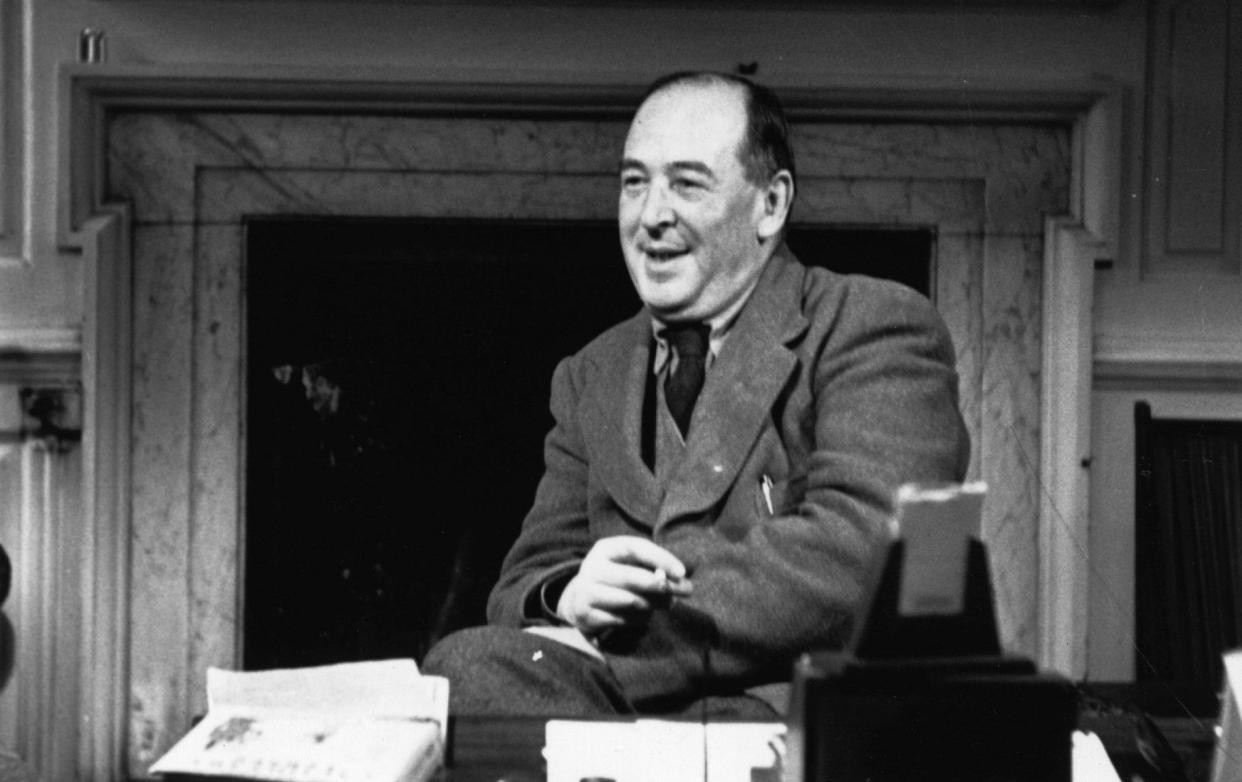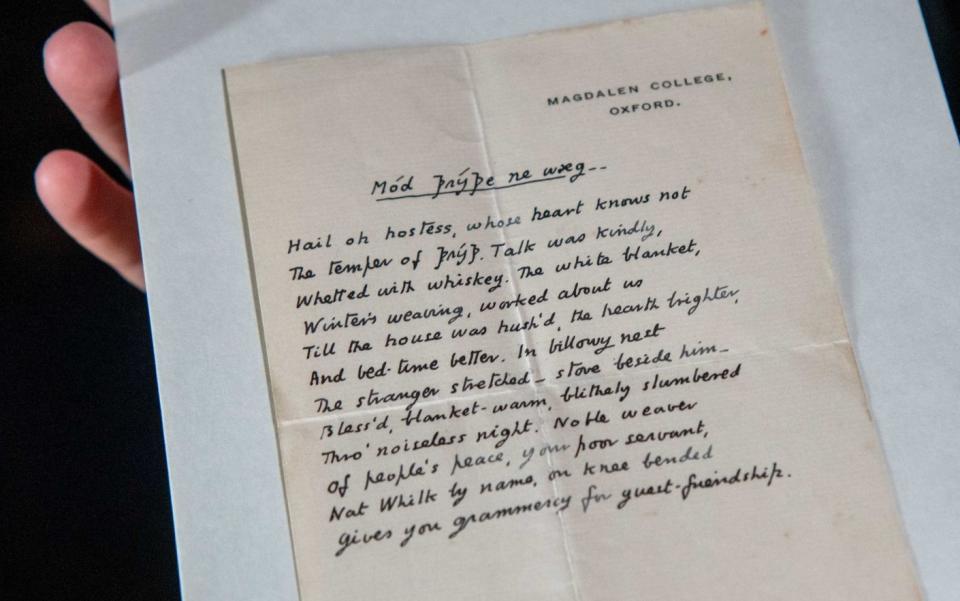Unknown CS Lewis poem on whisky and warm blankets discovered

- Oops!Something went wrong.Please try again later.
- Oops!Something went wrong.Please try again later.
A previously-unknown poem by CS Lewis, in which he finds inspiration in whisky, warm blankets and the Anglo-Saxon epic Beowulf, has been discovered.
The Chronicles of Narnia author wrote the 12-line alliterative poem in 1935, on notepaper from Magdalen College, Oxford, where he taught.
His passionate interest in Old English, or Anglo-Saxon, is reflected in the title, Mód Þrýþe Ne Wæg, the pen name he used, Nat Whilk, and the word “Þrýþ” in the second line.
It was a thank-you poem from one medievalist to another who would have understood the language and the allusions to Beowulf, through the style in which the verse epic was written and its metre.
Lewis wrote the poem after visiting the Manchester home of Dr Ida Lilian Gordon, a specialist in Medieval English and Old Norse, and her husband, Eric Valentine Gordon, a professor of English language.
The couple were also good friends with JRR Tolkien, the Lord of the Rings author. The poem casts light on the friendships between these fantasy writers and medievalists.

Thanking the Gordons for his overnight stay, Lewis wrote: “…Talk was kindly,/ Whetted with whiskey. The white blanket,/ Winter’s weaving, worked about us/ Till the house was hush’d, the hearth brighter,/ And bed-time better…”
Written in black ink, it had been overlooked among documents relating to Tolkien and the Gordons acquired by the University of Leeds a decade ago.
It has now been discovered by Dr Andoni Cossio, of the University of the Basque Country and the University of Glasgow, who spotted it while doing some research.
He told The Telegraph: “The discovery of this hidden treasure made me feel elated. I was astonished to find that this poem doesn’t appear in any of [Lewis’s] collected works.
“The excitement mostly comes from the fact that it is difficult to find new works from these writers, especially because people have mined the archives, searching for these kinds of things. Normally we get letters or other documents, but not poetry or literary works…

“Lewis published many poems in modern English which adapt Old English metre – The Nameless Isle is a good example… [The poems used] just an adapted Old English metre, not words.
“He signed other poems under the pen name Nat Whilk though… This confirms that, by 1935, he already had good knowledge and command of this … adaptation of this Old English metre in which Beowulf was written.”
Dr Cossio said: “It had everything I could wish for – biographical details, Old English, alliterative metre, and Lewis’s writing at its best… It had passed completely unnoticed…
“It was kept by the Gordons, then by their daughter, until she sold the collection of letters and different manuscripts that are now at Leeds. So this has been hidden from the public eye. Nobody, except the Gordons, had seen this literary work by Lewis.”
Playful references to Beowulf
He added that the poem’s Old English title is complicated to translate and involves playful references to Beowulf, which Lewis taught at Oxford.
Dr Cossio said: “Þrýþ, according to Lewis and Tolkien, is the name of Offa’s evil queen in the Beowulf poem… Mód Þrýþe Ne Wæg is translated very poetically within the poem by Lewis as ‘whose heart knows not the temper of Þrýþ’, which means that Ida Gordon is the exact opposite of Þrýþ, that she was a good human being.”
Lewis’s use of the pen name Nat Whilk was “a modernised version of the Old English nāt-hwylc ̇, meaning “someone” or, in this case, simply “anonymous”.
In his critical commentary in the Journal of Inklings Studies, Dr Cossio writes: “For Tolkien, Lewis and their circle, poetry was a way to explore their shared love of language and lore, and to develop their own writing. The thing I like most about this poem is that it opens a little door to that world.”
He adds that, while Tolkien wrote the Gordons an Old English bridal song as a wedding present in 1930, Lewis’s friendship with the couple has been overlooked until now: “It is plain from the content of the poem and the invitation to stay overnight at the Gordons’ that both wife and husband were more than acquaintances…
“However, there is no trace of their friendship in Lewis’s published biographical details or letters…
“In contrast, it is well recorded that Lewis and Tolkien became friends at Oxford and started an informal society of writers called ‘The Inklings’, which met weekly to read and comment on its members’ work – a key part of the development of Narnia and Middle-earth.”
‘We tend to associate Beowulf with Tolkien’
Simon Horobin, professor of English Language and Literature at Magdalen College, Oxford, and author of the forthcoming book CS Lewis’s Oxford, said: “We tend to associate Beowulf with Tolkien rather than Lewis, given his famous lecture The Monsters and the Critics… But this new discovery reminds us that Lewis was also immersed in the poem.
“I’ve recently come across translations of extracts from Beowulf that Lewis made when teaching it to his students, which show him thinking carefully about the poem’s style and meaning.
“In CS Lewis’s Oxford, I talk about Lewis’s late-night ‘Beer and Beowulf’ sessions which he held at Magdalen, at which students recited the poem aloud and drank beer from the barrel Lewis kept in his rooms.
“Tolkien was an occasional visitor to these meetings, offering insights into the poem’s wider contexts and competing with Lewis in blowing smoke rings.”
Sarah Prescott, literary archivist in Special Collections at the University of Leeds, said: “We’re very excited to now be able to say we have an original CS Lewis poem in our collections.”
News of the discovery comes as an exhibition, CS Lewis: Words and Worlds, is due to open at Magdalen College on April 24.

